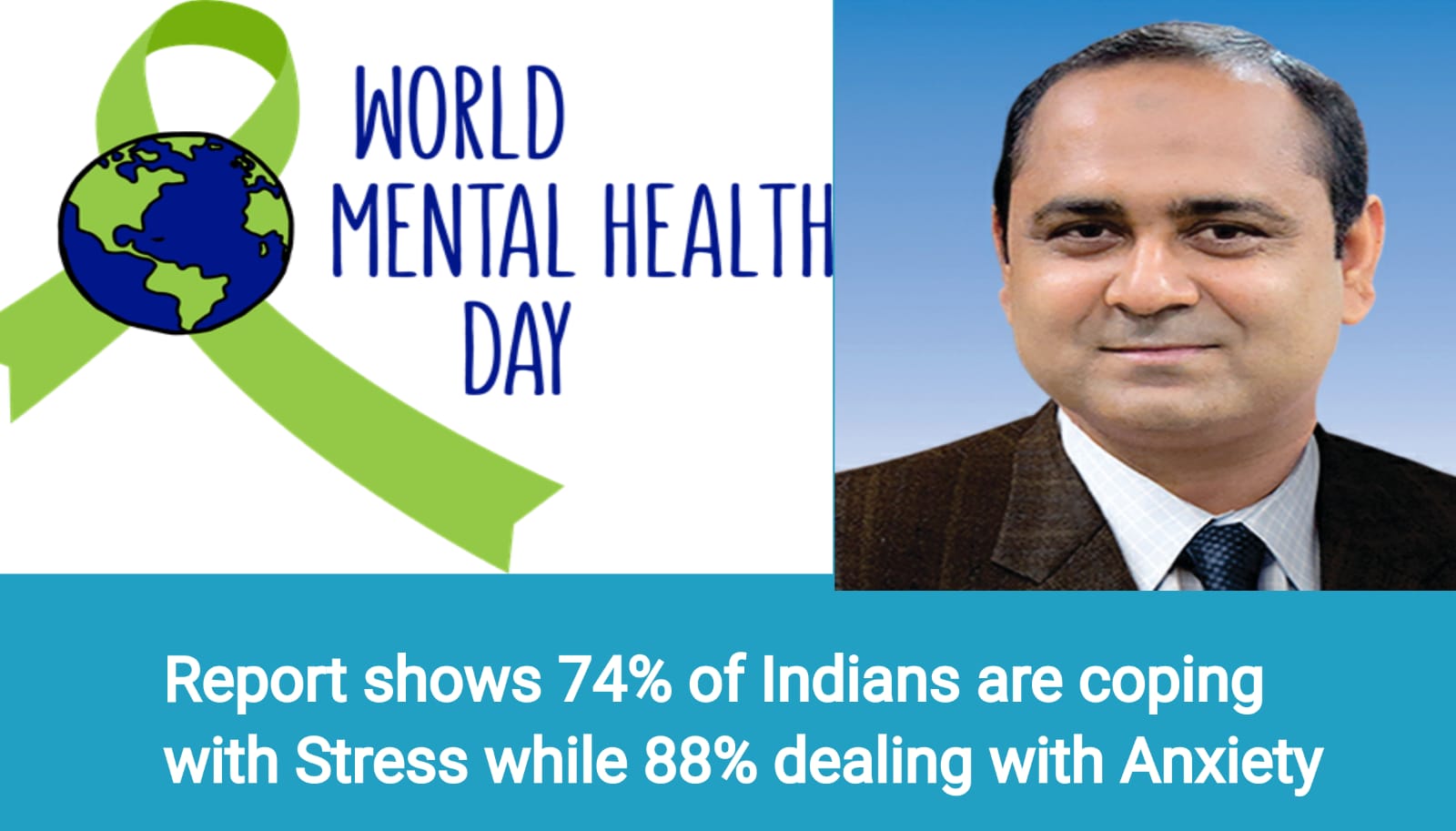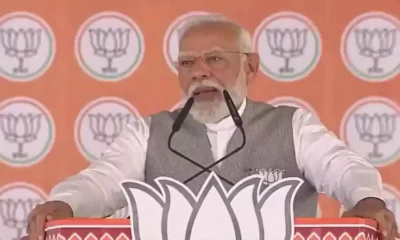Blogs
According to a study, 74% of Indians are suffering from Stress while 88% from Anxiety
which can lead to constant sadness, social isolation, lack of interest in life, disturbed sleep cycle and several other complications

which can lead to constant sadness, social isolation, lack of interest in life, disturbed sleep cycle and several other complications
Opines Dr. K. M. Saifullah, Chief Medical Director of Naturoveda
As per a study conducted by The Center of Healing (TCOH), Delhi, stress and anxiety levels among Indians have been increased to 74% and 88%, respectively. In this fast-paced world, psychological disorders like stress and anxiety are becoming very common. Conflict with loved ones, death or loss of someone close, heavy workload, a family history of psychological issues, prolonged exposure to certain medications, physical or emotional trauma, drug addiction are some top reasons behind stress and anxiety. If not treated timely, it may invite several other complications like depression, personality disorders, social isolation, drug misuse, various health issues, even suicidal thoughts and so on.
On the occasion of World Mental Health day, Dr. K.M. Saifullah, the Chief Medical Director, Naturoveda Health World, shares 7 amazing tips to win over stress and anxiety in a natural and safe way.
Fight Stress and Anxiety by Following These Simple Steps :
1) Eat a nutritious diet: A healthy and balanced diet helps in maintaining a sharp mind and a fit body. This comprises the right amount of carbohydrates, proteins & fats along with the inclusion of vitamins, minerals and amino acids in our daily diet. The combination of Vitamins B6, B9 & B12 enriched foods also plays a major role in lowering several mental disorders by promoting wellness, improving sleep and elevating the mood. These vitamins can be found in foods such as leafy green vegetables, legumes, milk, eggs, fish, citrus fruits and nuts.
2) Be physically active: Regular exercise is an easy way to burst your stress. Studies have proven that exercise helps to lower the level of the stress hormone “cortisol”. This happens because during exercise, the body releases endorphins that lift the mood and drive away anxiety. Exercising for 45 minutes a day, 5 days a week is ideal.
3) Indulge in deep-breathing exercises: Deep breathing techniques have several positive effects on our mind. They have a calming effect on the mind and simultaneously relax all the muscles from head to toe. You can practice deep, slow breathing whenever you feel the stress or at regular intervals throughout the day. 3 minutes of deep breathing every two hours is recommended.
4) Think positive: Negative thoughts tend to make people gloomy and sad. Therefore, trying to keep negative thoughts at bay is the best way to keep panic attacks away. Focus on the things that make you happy and confident. You may start practicing positive self-talks. Identify the negative factors that trigger mental disorders and try to avoid it. You must remember that you are only responsible for your thoughts. Share your problems with your friends and family and be always prepared for the ups and downs of life.
5) Follow routine: Anxiety makes an individual unorganized and lose track of time. Setting up a routine and following it on a regular basis gives life a purpose. Idleness leads to frustration which further gives birth to depression. Maintaining a routine will be like a guardian to keep a check on your activities. At times, you might feel like not following the routine due to various reasons. In such a situation, do not listen to yourself. This routine should be followed even in the worst situation. Trust me, it will definitely work for you.
6) Inculcate hobbies: Understanding yourself is the best way to keep your mind happy and relaxed. All work and no play makes Jack a dull boy. So alongside work, every person should have a hobby to keep oneself attached during leisure time. If you do not have a hobby, cultivate one. Try different things and discover which one you enjoy the most. Adopt healthy habits like gardening, reading good books, writing journal and practicing gratitude.
7) Maintain a sleep routine : Minimum 7 hours of sleep is essential for an adult. People suffering from stress and anxiety often find it difficult to fall asleep. Maintaining a fixed bedtime every night will help the body get adapted to feeling sleepy at that point of time every night. This will ensure that an individual will quickly fall asleep after going to bed at the allotted sleep time. Remember to avoid gadgets minimum 30 minutes before going to sleep. The blue light emitted from the gadget’s display screen reduces “melatonin” which is the sleep hormone, thus hampering sleep.
Read Also: World Mental Health Day 2021: Here are 3 ways to improve your mental health during Covid
To get a safe and long-lasting solution you must treat the condition at the earlier. Natural treatment systems like Ayurveda, Unani and Yoga have emerged as a silver lining in the treatment of chronic stress and anxiety. According to Ayurveda, keeping the Tridoshas (Vata, Pitta & Kapha) in harmony is the key to ensuring complete health. Similarly, Unani says that keeping the 4 humors (Sauda, Safra, Balgham & Dam) in balance provides disease-free life. Nabz Shanasi (Nadi Parikshan) has the ability to identify the fluctuations of Sauda, Safra, Balgham & Dam and Vata, Pitta, Kapha to reveal the root cause of diseases. Unfortunately, the true art of Nabz Shanasi (Nadi Parikshan) is gradually becoming extinct. It takes time to master this intricate method of pulse-examination.
It is pertinent to mention here that Dr. K. M. Saifullah has remarkable command over Nabz Shanasi (Nadi Parikshan). He is a Bachelor of Unani Medicine and Surgery and has acquiescence with renowned
Ayurvedic and Unani physicians.
Blogs
Fueling Rural Entrepreneurship: Small Business Loans Revolutionizing Rural India

New Delhi (India), July 15: Rural areas form the backbone of India’s economy, with a vast population engaged in agriculture and small-scale enterprises. However, accessing financial resources to fuel rural entrepreneurship has traditionally been challenging. Small business loans have emerged as a powerful tool in revolutionizing rural India, providing much-needed capital to aspiring entrepreneurs and driving economic growth. In this blog, we will explore how small business loans are transforming the rural entrepreneurial landscape, fostering innovation, creating employment opportunities, and uplifting rural communities.
Encouraging Agripreneurship and Diversification:
Agriculture-based businesses are the lifeline of rural India. Small business loans enable rural entrepreneurs to venture into agripreneurship and diversify their agricultural activities. These loans facilitate investments in modern farming techniques, equipment, and infrastructure, enhancing productivity and profitability. Additionally, entrepreneurs can explore value-addition opportunities, such as food processing, organic farming, and agricultural services, creating new revenue streams and reducing dependence on traditional farming practices.
Promoting Rural Micro, Small, and Medium Enterprises (MSMEs):
Micro, small, and medium enterprises (MSMEs) play a crucial role in rural development and employment generation. Small business loans cater specifically to the needs of rural MSMEs, providing financial support for business expansion, technology adoption, and market diversification. These loans enable entrepreneurs to establish and grow businesses in sectors such as handicrafts, textiles, cottage industries, and rural tourism. By promoting rural MSMEs, small business loans contribute to the overall socio-economic development of rural communities.
Bridging the Infrastructure Gap:
Rural areas often face infrastructure challenges, such as inadequate transportation networks, limited access to electricity, and lack of storage facilities. Small business loans address these issues by enabling entrepreneurs to invest in infrastructure development. Whether it’s setting up rural warehouses, cold storage units, or transportation services, these loans empower entrepreneurs to bridge the infrastructure gap. Improved infrastructure not only facilitates the growth of rural businesses but also attracts investments, creates employment opportunities, and enhances the overall quality of life in rural areas.
Empowering Women in Rural Entrepreneurship:
Small business loans are empowering rural women to break gender barriers and participate actively in entrepreneurship. These loans provide financial support to women entrepreneurs, enabling them to start businesses, acquire assets, and access markets. Additionally, loan programs often incorporate skill development and capacity-building initiatives tailored for women entrepreneurs. By encouraging women’s participation in rural entrepreneurship, small business loans contribute to gender equality, women’s empowerment, and the economic progress of rural communities.
Strengthening Local Supply Chains and Market Linkages:
Small business loans play a vital role in strengthening local supply chains and market linkages in rural India. Entrepreneurs can utilize these loans to enhance their production capabilities, improve product quality, and establish robust distribution networks. By connecting rural businesses with larger markets, these loans enable entrepreneurs to access better pricing, expand their customer base, and increase their profitability. Strengthening local supply chains not only boosts rural businesses but also promotes sustainable economic growth and reduces rural-urban migration.
Small business loans have emerged as a powerful force in revolutionizing rural India. By fueling rural entrepreneurship, these loans promote agripreneurship, boost rural MSMEs, bridge infrastructure gaps, empower women, and strengthen local supply chains. As more entrepreneurs in rural areas gain access to capital, they contribute to economic growth, employment generation, and the overall development of rural communities. It is imperative for financial institutions, government agencies, and other stakeholders to continue expanding small business loan programs and providing targeted support to rural entrepreneurs. Through these efforts, we can unleash the full potential of rural India and build a more inclusive and prosperous nation.
Blogs
January 2023 starts with positive prospects for the price of gold

Even in 2023, many traders share an interest in gold, not just because this is one of the most popular precious metals, but also thanks to the accessibility of gold (or other gold derivatives) trading. With growing political uncertainty, 2022 ended on a disappointing note for bulls, but 2023 is a whole other story, and prospects seem to be more optimistic.
Past performance should not be treated as a 100% accurate forecast tool, but there are a few variables that gold bulls should keep in mind, moving into 2023.
Seasonality
The first of these variables is seasonality, and the good news is that January continues to be the most suited month for the price of gold to rise, based on data going back to 1972. More specifically, the average monthly returns in January are estimated at 1.6%, followed by 1.0% in February.
During the last several months, central banks around the world increased their gold reserves at an irregular pace, as a result of geopolitical factors. Once Russia started the war on Ukraine, assets held by high-ranking businessmen and Russian institutions were seized. This makes liquid assets such as US Treasuries less attractive, especially when it comes to countries that have an antagonistic view compared to the USA.
Peak USD bullishness?
According to data available on the website of Easymarkets, gold is trading at around $1,800 after a slow but steady recovery, beginning November 2022. This is a result of peaking USD performance against other currencies.
The FED hiked rates fast, which meant flows favoring the Dollar, and that in turn did not act as a tailwind for gold. Now that the USD has seemingly paused its rally, gold has more room to go up, unless risk aversion once again becomes dominant in the market.
In terms of macroeconomics, US inflation is already slowing, while Europe and Japan seem to be lagging by at least a few months. The same goes for economic conditions, which can be seen deteriorating worldwide. That is not supportive of a continued rise of inflation and at some point, it could be a reason for the FED to pivot and start cutting interest rates.
Interest rates
When plotting the price of gold on top of US Treasury rates, a negative correlation can be spotted. Rates up lead to gold going down and since the market is already anticipating a peak in tightening, government bonds are set to rise in 2023.
That means interest rates have less upside potential, supporting a continued rise in the gold price as the year starts. Remember that all financial assets, regardless of risk profile, are sensitive to interest rates, because they affect market liquidity, as well as the discounting effect for future returns.
There are no certainties when predicting where gold will be at the end of January, but if seasonality, the US Dollar, and interest rates act as a confluence of positive factors, the first month of 2023 can continue the precious metal’s rise.
Blogs
An Insight Into Legality Of Horse Racing Betting In India

Regarding gambling, few countries have such a long and fascinating history as India. Horse racing is one of India’s most popular forms of betting and has been for centuries.
Horse racing betting is an activity loved by locals and fantastic entertainment, highly valued internationally. The industry employs millions of people, including jockeys, trainers, and grooms, and fills stadiums worldwide with passionate punters.
However, there are still many questions about whether or not online horse betting is legal in India. To try and understand more about the legalities involved and get an insight into horse racing betting in India, more generally, has become more critical than ever before. In this article, we take a look at some of these issues to clear up any confusion that may arise when considering wagering on equine events in the nation.
What is the Legal Status of Horse Racing Betting in India?
The legal status of horse racing betting in India is complicated. While it is considered legal and regulated, certain restrictions apply to the activity.
For example, online betting on horse races is not allowed, and only approved physical racecourses are permitted to offer this service. Additionally, specific regulations have been put in place by the Central Government’s Ministry of Home Affairs, which states that any form of gambling or wagering must occur within a licensed premise or area.
This means that even if you were to find a way to bet on a horse race online, you would still be required to visit an authorized racetrack or facility to do so physically. Fortunately, you can check our recommended sites for betting on horse races in India, which are approved by the government and operate within the confines of the law. The listed websites are reliable and secure, allowing you to place bets without the worry of any legal repercussions.
Therefore, while it is possible to bet on horse racing in India legally, the activity must be done within a licensed and regulated environment.
How Can I Bet on Horse Racing in India?
If you’re looking to place a bet on a horse race in India, the best way to do so is by visiting the nearest licensed racetrack. Here, you will be able to find one of the many bookmakers available and get started with your betting.
When placing a bet at the track, it is essential to remember that you must be 18 or over to participate and that all bets must be made in Indian Rupees (INR). Before placing any wagers, it is also essential to familiarise yourself with all applicable laws. It is also important to note that any winnings from horse racing betting must be declared and taxed accordingly.
Horse Racing vs. other forms of gambling
Horse racing betting is a form of gambling which has been around for centuries and is seen as one of the most popular forms in India. In comparison to other forms of gambling, such as casino games or sports betting, horse racing betting offers a much more traditional and social experience.
In addition to this, because it is only allowed at licensed racetracks, it is also considered safer than other forms of online gambling, which the government does not regulate.
Cricket betting is also hugely popular in India, with many people wagering about the outcome of cricket matches. While this form of gambling has been legalized in recent years, it is still considered illegal if done online. This means that cricket betting must be done through licensed bookmakers at physical premises or racetracks.
Tips for Horse Racing Betting in India
When betting on horse racing in India, there are a few tips that you should keep in mind.
- Choose Your Racetrack Carefully – Not all racetracks are created equal, so choosing the best suits your needs is crucial. Research the track’s history and review any reviews or ratings.
- Do Your Research – Before placing a bet, do your research and get to know the horses you are betting on. Look at their past performances and find out about their trainers and jockeys.
- Set a Budget – Gambling can be an addictive activity, so it is vital to set yourself a budget and stick to it. This will help ensure you don’t overspend and stay within your means when betting on horse races in India.
- Understand the Odds – Before placing a wager, it is essential to understand the odds. This will help you make an informed decision and ensure you get the best value for your money.
- Utilise Technology – Take advantage of technology and use apps or websites to track results, compare odds and get tips on which horses are likely to perform well in upcoming races.
- Check the rules and regulations of the racetrack you’re visiting to ensure that your bets are within the limits and guidelines.
Following these tips ensures that your horse racing betting experience in India is safe and enjoyable.
General requirements to take part in Horse Racing Betting in India
To take part in horse racing betting in India, you must be 18 or over and have an Indian ID that can be used to verify your age. Additionally, you will need to provide proof of residence and a valid credit/debit card for online transactions.
Furthermore, it is essential to remember that all races are governed by the rules and regulations of the track in which they are held, so it is necessary to familiarise yourself with these before placing any bets. Also, it is essential to note that horse racing betting is only allowed at licensed racetracks, so it is necessary to check the licensing status of any track you visit.
Conclusion
In conclusion, horse racing betting in India is legal and regulated, but certain restrictions apply to the activity. To ensure a safe and enjoyable experience when placing bets, it is important to familiarize yourself with all relevant laws and regulations and do your research before wagering on any horses. Additionally, choose your racetrack carefully and set a budget, so you can avoid overspending or get into financial difficulty.
-

 Entertainment23 hours ago
Entertainment23 hours agoOn wife Anushka Sharma’s birthday, Virat Kohli says he would’ve been lost without her
-

 Entertainment22 hours ago
Entertainment22 hours agoPushpa Pushpa: Allu Arjun starrer Pushpa 2 first song released
-

 India News24 hours ago
India News24 hours agoAmit Shah says BJP will neither remove reservation for SCs, STs and OBC, nor will allow Congress to do so
-

 2024 Lok Sabha Elections21 hours ago
2024 Lok Sabha Elections21 hours agoFarooq Abdullah accuses PM Modi of trying to divide the country over religion
-

 India News22 hours ago
India News22 hours agoKarnataka CM Siddaramaiah writes to PM Modi, urges home ministry to cancel diplomatic passport of Prajwal Revanna
-

 Cricket news6 hours ago
Cricket news6 hours agoIPL 2024: Jonny Bairstow, Rilee Rossouw guide Punjab Kings to 7-wicket victory over Chennai Super Kings
-

 2024 Lok Sabha Elections4 hours ago
2024 Lok Sabha Elections4 hours agoPM Modi takes a dig at Rahul Gandhi, says Pakistan wants him as Prime Minister
-

 India News2 hours ago
India News2 hours agoSIT issues lookout notice for Prajwal Revanna in sex video case










